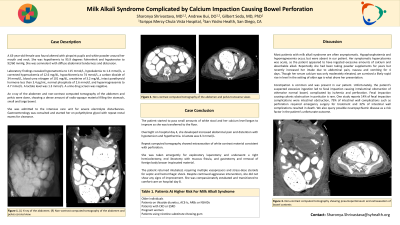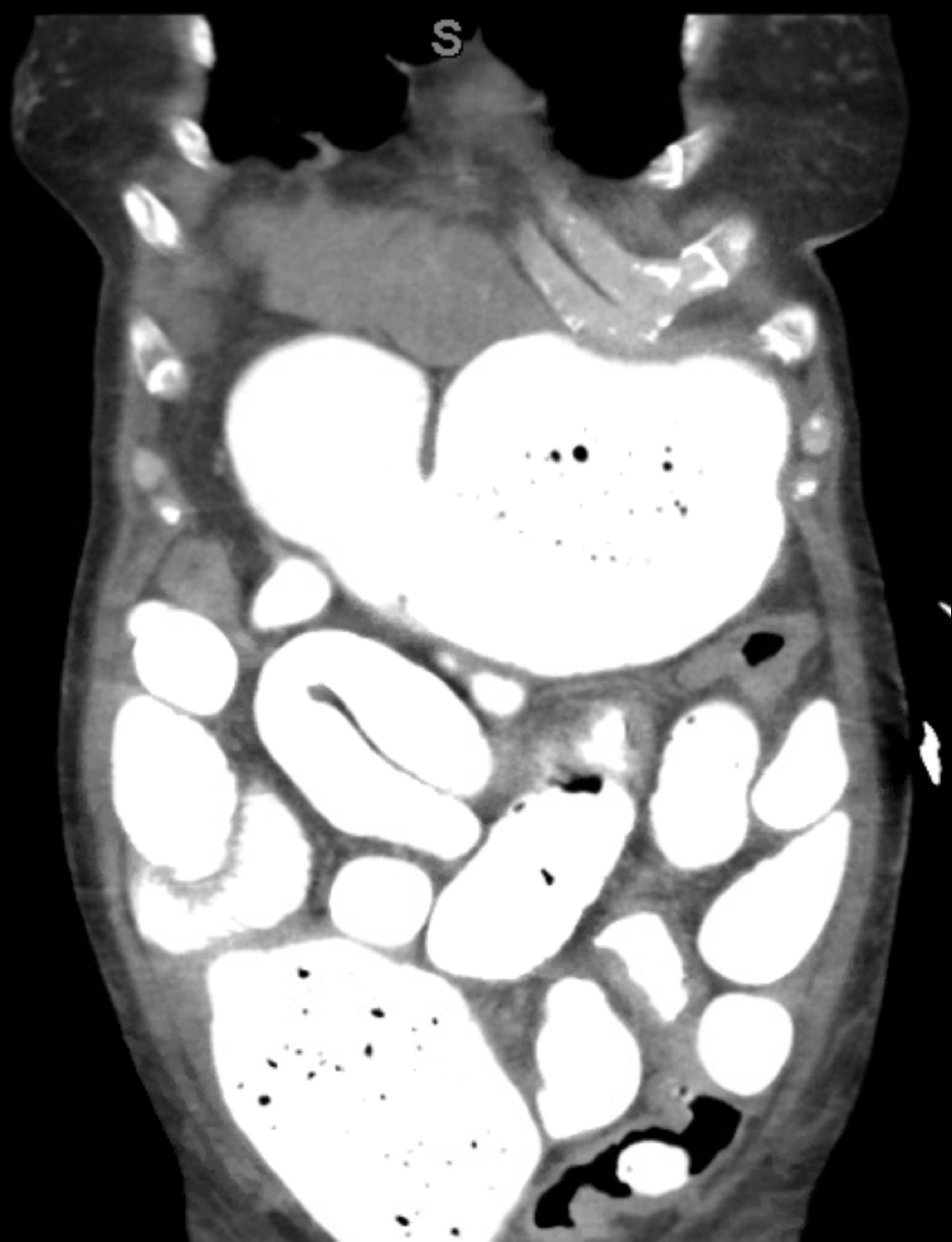Back


Poster Session B - Monday Morning
Category: Colon
B0107 - Milk Alkali Syndrome Complicated by Calcium Impaction Causing Bowel Perforation
Monday, October 24, 2022
10:00 AM – 12:00 PM ET
Location: Crown Ballroom

Has Audio

Sharonya Shrivastava, MD
San Ysidro Health/Scripps Mercy Chula Vista Hospital
San Diego, California
Presenting Author(s)
Sharonya Shrivastava, MD1, Andrew Bui, DO1, Gilbert Seda, MD, PhD2
1San Ysidro Health/Scripps Mercy Chula Vista Hospital, San Diego, CA; 2Scripps Mercy Hospital, Chula Vista, CA
Introduction: The milk-alkali syndrome consists of hypercalcemia, metabolic alkalosis, and acute kidney injury associated with the ingestion of large amounts of calcium and absorbable alkali. There has been a resurgence of this condition due to calcium therapy for prevention and treatment of osteoporosis, easy access to over-the-counter calcium carbonate preparations, and use of calcium carbonate to minimize secondary hyperparathyroidism in patients with chronic kidney disease. We report a rare case of severe milk-alkali syndrome resulting in hemodynamic instability and multiple metabolic derangements with severe intestinal obstruction in the setting of fecal impaction.
Case Description/Methods: A 63-year-old female with an unspecified psychiatric disorder was brought to the emergency room with altered mental status and with a white powder around her mouth and neck. She was hypothermic and hypotensive. On exam she was somnolent with diffuse abdominal tenderness and distension. Laboratory findings revealed hyponatremia, hypokalemia, hypercalcemia of 12.6 mg/dL, metabolic alkalosis, acute kidney injury, undetectable intact parathyroid hormone, normophosphatemia, and hypermagnesemia. A urine drug screen was negative. Non-contrast computed tomography (CT) of the abdomen and pelvis showed dense radio-opaque material filling the stomach, small and large bowel as well as constipation/fecal impaction and gastroparesis. Gastroenterology evaluated the patient for fecal disimpaction with minimal clinical improvement. Repeat CT showed extravasation of white contrast material consistent with small bowel perforation. She underwent emergent exploratory laparotomy with findings of creamy inspissated white material throughout the stomach and small intestine, causing large stercoral impaction of the cecum with gangrenous changes.
Discussion: Calcium powder causing gastrointestinal obstruction and bowel perforation is exceedingly rare. Few case reports exist demonstrating obstruction and/or perforation secondary to calcium powder, and specifically occurred during administration of calcium polystyrene sulfonate during treatment of hyperkalemia. Patients at highest risk for these complications appear to be those of older age and with reasons for preexisting reduced gastrointestinal motility. It is unknown what exact contents our patient ingested, but it is presumed it was calcium powder in extreme excess that led to her presentation.

Disclosures:
Sharonya Shrivastava, MD1, Andrew Bui, DO1, Gilbert Seda, MD, PhD2. B0107 - Milk Alkali Syndrome Complicated by Calcium Impaction Causing Bowel Perforation, ACG 2022 Annual Scientific Meeting Abstracts. Charlotte, NC: American College of Gastroenterology.
1San Ysidro Health/Scripps Mercy Chula Vista Hospital, San Diego, CA; 2Scripps Mercy Hospital, Chula Vista, CA
Introduction: The milk-alkali syndrome consists of hypercalcemia, metabolic alkalosis, and acute kidney injury associated with the ingestion of large amounts of calcium and absorbable alkali. There has been a resurgence of this condition due to calcium therapy for prevention and treatment of osteoporosis, easy access to over-the-counter calcium carbonate preparations, and use of calcium carbonate to minimize secondary hyperparathyroidism in patients with chronic kidney disease. We report a rare case of severe milk-alkali syndrome resulting in hemodynamic instability and multiple metabolic derangements with severe intestinal obstruction in the setting of fecal impaction.
Case Description/Methods: A 63-year-old female with an unspecified psychiatric disorder was brought to the emergency room with altered mental status and with a white powder around her mouth and neck. She was hypothermic and hypotensive. On exam she was somnolent with diffuse abdominal tenderness and distension. Laboratory findings revealed hyponatremia, hypokalemia, hypercalcemia of 12.6 mg/dL, metabolic alkalosis, acute kidney injury, undetectable intact parathyroid hormone, normophosphatemia, and hypermagnesemia. A urine drug screen was negative. Non-contrast computed tomography (CT) of the abdomen and pelvis showed dense radio-opaque material filling the stomach, small and large bowel as well as constipation/fecal impaction and gastroparesis. Gastroenterology evaluated the patient for fecal disimpaction with minimal clinical improvement. Repeat CT showed extravasation of white contrast material consistent with small bowel perforation. She underwent emergent exploratory laparotomy with findings of creamy inspissated white material throughout the stomach and small intestine, causing large stercoral impaction of the cecum with gangrenous changes.
Discussion: Calcium powder causing gastrointestinal obstruction and bowel perforation is exceedingly rare. Few case reports exist demonstrating obstruction and/or perforation secondary to calcium powder, and specifically occurred during administration of calcium polystyrene sulfonate during treatment of hyperkalemia. Patients at highest risk for these complications appear to be those of older age and with reasons for preexisting reduced gastrointestinal motility. It is unknown what exact contents our patient ingested, but it is presumed it was calcium powder in extreme excess that led to her presentation.

Figure: Non-contrast computed tomography of the abdomen and pelvis coronal view
Disclosures:
Sharonya Shrivastava indicated no relevant financial relationships.
Andrew Bui indicated no relevant financial relationships.
Gilbert Seda indicated no relevant financial relationships.
Sharonya Shrivastava, MD1, Andrew Bui, DO1, Gilbert Seda, MD, PhD2. B0107 - Milk Alkali Syndrome Complicated by Calcium Impaction Causing Bowel Perforation, ACG 2022 Annual Scientific Meeting Abstracts. Charlotte, NC: American College of Gastroenterology.
